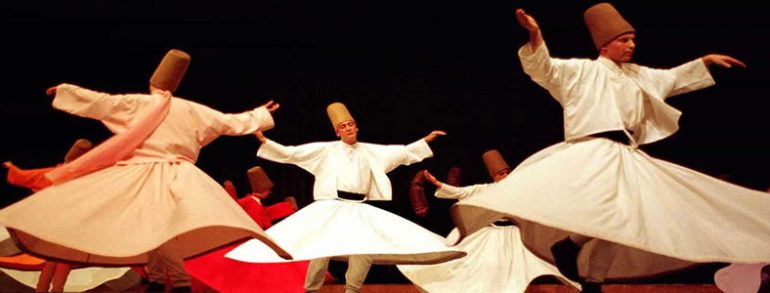After the death of Mevlâna Rumi in 1273 his son, Veled, and his disciples founded the Mevlevi Order to institutionalize his teachings.
A branch of the Sufi tradition of Islam, the Mevlâna Order is based on the values of loving and being of service to people. The stunning ritual performed by the Mevlevi Order symbolizes these universal values. This spiritual journey to find the truth, which requires “self-discipline”, was a harder job than the medrese (theological university) education. Above all, the students must be very kind and respectful. They should also be discreet to extremes in behavior or in speech. The complete surrender of the ego is gained through ritual dance (sema) and physical training.
The central building of the Mevlevi Order, "Mevlevi Âsitâne", is the place where the students, "Can"-fellow soul-, spend 1001 days for education. After the education, the title of "Can" becomes "Dede". The Mevlâna Order functions in a particularly designed Sufi lodge complex, called "Dergâh" (education center), literally "threshold". The complex mostly includes from semahane (ritual hall), tomb, cemetery, and a small mosque. Dergâh is the head of the smaller Sufi units called Tekke. The head of the Dergâh is Postnişin (Sheikh), who was chosen from the male descendants of Mevlâna's family. Postnişin sits on the sheepskin during the sema ceremony. First established in Konya, Mevlevi Lodge (Mevlevihane) was quickly spread to the many cities in the east and west. Makam-ı Çelebi (Chief Master), the head of the Order, is elected from the male descendants of Mevlâna.
Çelebi (Chalabi), a title given to the Mevlevi leaders, also means "gentleman", and courteous in Turkish. After Mevlâna's death, his student Hüsameddin Çelebi was offered to take over his teaching position. After Hüsameddin Çelebi, the post of Çelebi has been traditionally selected among the male members of Mevlâna's family.
Sufism, the spiritual aspect of Islam, recognizes the unity of being, that we are not separate from the Divine. We are One: one people, one ecology, one universe, one being. If there is a single truth, it is the truth that we are all part of the Truth, not separate. In the Western world today, the believers of Sufism, even though they are not Muslim, follow the teaching of the Sufism. Non-Muslims often mistake Sufism as a sect of Islam. Sufism is more accurately described as an aspect or dimension of Islam. Sufi orders (Tariqas) can be found in Sunni, Shia and other Islamic groups. Although Sufis are relatively few in number, they have shaped Islamic world thought and history.
Through the centuries, Sufis contributed hugely to Islamic literature, for example, Rumi, Omar Khayyam and Al-Ghazali's influence extended beyond Muslim lands to be quoted by Western philosophers, writers and theologians. Also called "Tasavvuf (or Tasawwuf)" in the Muslim world, another name of Sufism is simply Ihsan, or “faith, sincerity”.










